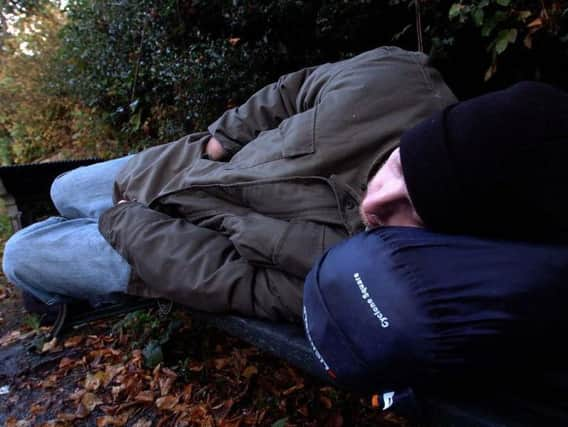Figures reveal a 288 per cent rise in number of rough sleepers in Derbyshire in eight years


The below estimates from the Ministry of Housing, Communities and Local Government show rough sleeping increased in the county by 288 per cent between autumn 2010 and autumn 2018.
The figures only give a snapshot of the situation as council workers either counted or estimated the number of rough sleepers on just one night.
Advertisement
Hide AdAdvertisement
Hide AdThe estimated number of rough sleepers in every local authority area in Derbyshire on a single night last autumn
• Amber Valley - Six rough sleepers on a single night last autumn, up from two in 2010
• Bolsover - Two rough sleepers on a single night last autumn, the same as in 2010
• Chesterfield - 18 rough sleepers on a single night last autumn, up from six in 2010
Advertisement
Hide Ad• Derbyshire Dales - One rough sleeper on a single night last autumn, up from zero in 2010
Advertisement
Hide Ad• Erewash - Nine rough sleepers on a single night last autumn, up from one in 2010
• High Peak - One rough sleeper on a single night last autumn, up from one in 2010
• North East Derbyshire - Three rough sleepers on a single night last autumn, up from zero in 2010
Advertisement
Hide Ad• South Derbyshire - No rough sleepers on a single night last autumn, down from one in 2010
• Derby City - 26 rough sleepers on a single night last autumn, up from four in 2010
Advertisement
Hide AdLocal authorities across England estimated there were 4,677 people sleeping rough on a single night last autumn.
This was a slight drop from the previous year when 4,751 rough sleepers were counted - the first decrease for eight years.
Advertisement
Hide AdHowever, the number of rough sleepers has increased significantly since 2010 when there were just 1,768 recorded cases.
Communities secretary James Brokenshire said: "The number of vulnerable people sleeping on our streets has now fallen for the first time in eight years.
"I am pleased to see our strategy to end rough sleeping, backed by a record investment of £100million, is starting to have an effect and there are particularly encouraging results in those areas funded by our Rough Sleeping Initiative where numbers have fallen by almost a quarter.
Advertisement
Hide Ad"But while these figures are undoubtedly a step in the right direction, I do not underestimate the task ahead in achieving our ambition of eliminating rough sleeping altogether by 2027.
Advertisement
Hide Ad"Councils have used the new funding to create an additional 1,750 beds and 500 rough sleeping support staff, who are working tirelessly to support people off the streets and into recovery.
"I am clear we need to go further than ever before to build upon the results and sustain momentum as we move towards ending rough sleeping."
Hosuing charity Shelter blamed a lack of social homes, spiralling rents and a 'faulty' benefits system for the rise in the number of rough sleepers.
Chief executive Polly Neate said: "We welcome many of the things that the Government has been doing to seek to improve services for rough sleepers - but without fundamental action to tackle the root causes of homelessness, these measures will only achieve so much."
Advertisement
Hide AdAdvertisement
Hide AdPaul Nobet, head of public affairs at homelessness charity Centrepoint, warned that there were many more 'hidden' homeless people living in unsafe accommodation who were not recorded in the rough sleeper count.
He said: "These snapshot statistics may show a slight decrease in the number of people rough sleeping, but these figures are only the tip of a much larger iceberg."
Jon Sparkes, chief executive of homelessness charity Crisis, added: "It's a damning reflection of our society that night after night, so many people are forced to sleep rough on our streets - with numbers soaring in the capital - especially when we know that with the right commitment, rough sleeping could be ended for good."
He added: "Living on the streets is one of the most dangerous experiences anyone could face.
Advertisement
Hide Ad"Not only will rough sleepers experience extreme isolation and often severe weather conditions, but we know they have a high risk of dying young and our own research shows they are 17 times more likely to experience abuse than the general public.
"No one should have to live like this."